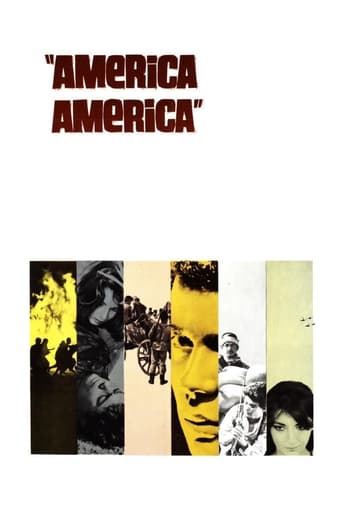leethomas-11621
Totally involving study of youth and dreams. Master director and writer, the genius Kazan nine years after On The Waterfront, tells the story with personal conviction. The result is film-making that cannot be bettered. The heart-breaking scene of Stavros surrounded by the upper-class passengers dancing by himself on the deck of the ship to help him escape his pain is unforgettable.
I loved the picaresque nature of the story and seeing the palpable changes in Stavros. The movie could have been sentimental but Kazan doesn't allow it to be. The characters from the different ethnicities and classes are created with real understanding. There are no "minor" roles. Without becoming overbearing, every detail is perfect.
Even though it deals with dark themes the film is a total delight.
faraaj-1
Only in the last 5 minutes of America, America is there any action actually filmed in America. The prelude to that - a good 2 hrs 40 minutes - is about one young man's struggle against the odds to reach America: the land of opportunity. This, director Elia Kazan's most personal project and favorite film, is partly biographical based as it is on the experiences of his eldest uncle Stavros.Elia Kazan's name generates mixed feelings. According to some e.g. Stanley Kubrick, he was the greatest American director. Most others are unable to get past his "naming names" to the HUAC in the 50's. Be that as it may, his works need to be judged on their professional merit, and certainly no other film captures the immigrant experience in the early part of the 20th century like America, America.The only negative to the film is the lengthy running time and the slow pace for the first hour. Some have criticized the acting of the central character who occupies center stage for virtually the entire film. He's certainly no Brando, Clift, Dean or DeNiro. However, his accent and looks are much more Greek and that adds to the documentary like feel of the film.Instead of filming in Hollywood studio sets, Kazan and DP Haskell Wexler (who won a well-deserved Oscar) opted for locations in Turkey and Greece - the action being set in Central Anatolia and Constantinople. This gives the film a rougher, more realistic look absent from other Kazan films of the late 50s-60s. The tragedies and injustices meted out to minorities under Ottoman rule and the harshness of life are what really stays with you after the film is over. There are several emotional moments such as when Stavros gets engaged and his fiancée pleads to him, or when he finally lands in America and sends a letter home.
allanlevy
I saw America, America in 1963 when the movie came out and was extremely impressed with the way the years of the great immigration in the US was portrayed. Having Grandparents that immigrated from Turkey and Greece the images and the experience of the trip over to New York range true to the stories told to me by them. In a comment made in a recent blog the writer couldn't understand the desire of the immigrants to come to this country. The passion and the hope these immigrants had only could be understood by someone old enough to experience the whole immigrant movement of the 20's, 30's and 40's. The film itself has beautifully filmed images and a great film score. The film itself has been available as a PAL DVD and regional title in Europe and has not been released here in anything but VHS. Occasionally, it is shown on AMC but not too often. It appears that it has been tied up with some sort of legal issue. It is a perfect film for the Criterion Collection.
Sturgeon54
Imagine a film like "The Godfather" receiving almost no audience, relegated to the occasional appearance on the AMC channel, barely being released on VHS or DVD, and you will have some idea of the tragic fate of this lost epic masterpiece. As hard as it is to believe, this may be the prolific director Elia Kazan's greatest film achievement, yet hardly anyone has seen it. This is a film on the epic scale of "The Godfather," about a young Armenian man's escape from Turkish persecution, flight from Anatolia, and eventual immigration to Ellis Island - all based upon the the experiences of the director's uncle. What is also tragic is the fact that I can think of no other film which portrays the cruel persecution and genocide inflicted upon the Armenian minority by the Ottoman Turks in the early 20th century (which Hitler correctly pointed to as proof that the world would look the other way at the genocide he had planned in Europe in the 1930s). Every period detail in the film is perfect, from the Oscar-winning costume design to the set design, Greek folk music score, veteran Haskell Wexler's cinematography, and acting - especially lead actor Giallelis, whose intensity brings to mind some of Brando's early work.It is obvious that this film was a very personal piece of film-making for Kazan. And though I don't want to dwell as others do on Kazan's checkered past in his naming of communist colleagues for HUAC in the 1950s, it is interesting to note a parallel in the main character Stavros' personal anguish in making the choice to leave his wealthy wife and use her money to immigrate to the United States; both men made the conscious decision to drive a wedge between them and their past relationships. This is truly a film for all Americans to treasure, and if I had my way, I would make sure it was broadcast every 4th of July just as "It's a Wonderful Life" is broadcast every Christmas. As a nation of immigrants and descendants of immigrants, this is a film virtually every American can relate to. I can't figure out why it is so obscure.




